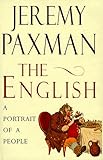 The English: a Portrait of a People by Jeremy Paxman (an English journalist, broadcaster and author) is a very interesting book, described as:
The English: a Portrait of a People by Jeremy Paxman (an English journalist, broadcaster and author) is a very interesting book, described as:
A book on what constitutes Englishness, and what are considered the essential characteristics and values. Using literary sources and interviews, Jeremy Paxman attempts to define how “Englishness” has changed over this century, and what it is now both in our own and outsider’s views.
It is full of historical information, but is a bit rambling, but even so it is very entertaining. He begins with ‘Being English used to be so easy‘ and goes on to say ‘It’s all so much more complicated now.’ And then proceeds to prove his point.
This makes it difficult to write about it, but easy to read. I like Paxman’s style of writing, I could almost hear him speaking as I read. He’s a person who has grown on me over the years and lately I’ve enjoyed his TV documentaries too. It’s always been entertaining to watch his interviews, even if I didn’t agree with his views – or his aggressive approach. It’s toned down in this book, but every now and then his acerbic nature comes across.
The easiest way to describe the book is to look at the chapter headings. There are chapters on ‘Funny Foreigners’, ‘The English Empire’, and ‘There Always Was An England’ – in which he concludes ‘the chasm between the imaginative England and the real England won’t do any longer because it fails to reflect the lives of the majority.‘ Other chapters are about the ‘Ideal Englishman’, the ‘True Born Englishman and Other Lies’ and so on. But it’s the index that shows the full breadth of the topics he covers, from the ‘Abbey National Bank’ to ‘Zadok the Priest (Handel)’.
He writes about food, sport, football hooligans, language, individualism, education, religion, ‘John Bull’, cities and the countryside – the English idyllic village, class structure and social tone, attitudes to women, business and trade to name but a few topics. It’s well researched and very readable, with a bibliography listing all the books he mentions plus others that presumably he has used.
It was published in 1998, so things have moved on a lot since then, but I still think it’s a valid book. I’ve had it for about four years and was prompted to read it now by all the discussion about Scottish Independence, if only to see if he could clarify what it means to be ‘English’. He points out the thoughtless way people have of muddling up ‘England’ with ‘Britain’, as if the Scots and Welsh do not exist (it annoys me too).
But I don’t really feel any clearer about what is is to be ‘English’. It seems there really is no such thing as ‘the English’ – we’re a mixture of all sorts, or as Paxman puts it, The English are a mongrel race‘. (page 59) It’s hard to do justice to this book in one short post and there is so much more that I could write about – but it would be far better to read the book itself.
It’s a very hard book to review but I think you did a good job. And I agree he does ramble about all over the place but most of it is interesting. I can also recommend ‘On Royalty’ and ‘The Political Animal’ which sounds like it might be dry but is in fact very readable indeed.
LikeLike
Thanks, Cath. I’ll certainly look out for on Royalty’ and €˜The Political Animal’.
LikeLike
I always have to catch myself up before unthinkingly saying “British” – such a tiny land and so much diversity. I lived in “England” for five years and barely scraped the surface of that bit! I read this when it came out and thought it really worked for a foreigner who wanted to have a go at sorting the mysteries of a country out.
LikeLike
I’ve had this book for a while and I use it sometimes with English audiences in my cross-cultural training workshops to point out some of their own cultural assumptions and blind spots. It is quite a funny read, very opinionated of course, as one would expect of Paxman. For a more thoughtful, anthropological approach, I do love Kate Fox’s ‘Watching the English’.
LikeLike
Margaret – What a fascinating concept for a book. I’d think that being English, and what counts as ‘English/ would indeed be hard to capture, but I think it’s fascinating to discuss what makes it means.
LikeLike
I might be interested in this one. Whenever anyone speaks of America being a melting pot, I think that London is another and I assume the different ethnic groups have spread throughout England as well. That might have a big influence on what makes an Englishman. By the way, my Scottish ancestors thank you for realizing we’re separate.
LikeLike
It sounds like a really interesting read. I’ve always been surprised that there are so few things which are thought of as being English. People just think of Morris dancers and not a lot more. I think that people were so busy celebrating the diverse cultural influences of the empire that England and the English forgot to preserve their own culture.
LikeLike